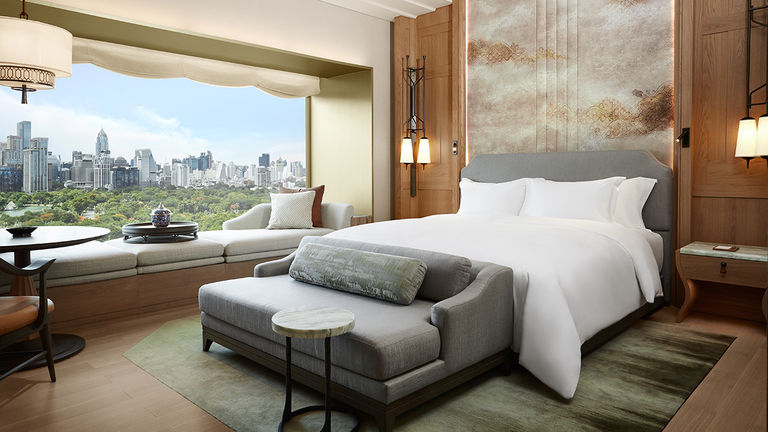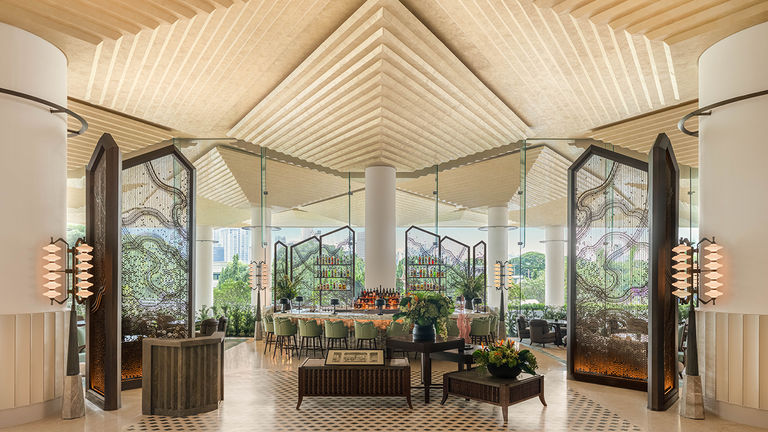For decades, Dusit Thani Bangkok was one of Thailand’s most iconic luxury hotels, a soaring oasis that was the nation’s tallest building when it opened in 1970. Although the original structure closed in 2019 and was demolished, the legendary property today has been reborn in a stunning new tower as part of an ambitious development project led by Dusit International.
I recently checked into the new Dusit Thani Bangkok, which debuted in September 2024 on the edge of Lumpini Park, a 142-acre stretch of green in the heart of Bangkok. The hotel exudes a tastefully subdued elegance that seamlessly blends modern design with traditional Thai elements, with eye-catching original artwork and clever visual nods to the original hotel — including its trademark spire that crowns the top of the building. The new property is part of Dusit Central Park, a mixed-used development that will offer lots of dining and shopping options when complete in the coming months.
Reimagining a revered hotel is no small task, and the process was so thorough that Dusit International produced a documentary series that’s viewable on the company’s YouTube channel.
Dusit’s focus on design and high standards of service was apparent as soon as my husband and I arrived to the property. Crisply uniformed staff rushed to greet us and take our luggage, as my eyes were drawn to the high-ceilinged lobby. The hotel’s interior design is the work of Hong Kong-based Andre Fu Studio, and the vibe is intentional, artistic and respectful, but never overpowering.
Next to the reception desk, a large, beautiful mural by contemporary artist Sakon Malee combines traditional Thai artwork with modern and contemporary techniques. The hotel staff can point out its fascinating details, including a depiction of the former Queen of Thailand, who was present at the opening of the first property, and the traditional house that once sat on the grounds of the current hotel.
Nearby, thick portions of column from the original building have been relocated and restored, allowing the original painting to be appreciated by guests once again. At Dusit Thani Bangkok, it’s worth taking time to notice the details.
 Dusit Thani Bangkok looks over Lumpini Park, a 142-acre green space in Bangkok.
Dusit Thani Bangkok looks over Lumpini Park, a 142-acre green space in Bangkok.
Credit: 2025 Dusit Hotels & ResortsA Room With an Unforgettable View
My jaw dropped as soon as we entered the Deluxe Corner room that would serve as home base for our two-night stay. All guestrooms feature a wide, seamless expanse of window, allowing for breathtaking views of Lumpini Park and the city, complemented by a long daybed for two, which invites guests to recline and gaze at the city outside. I was so enamored by the panorama, in fact, that I spent more time at the window during our stay than I did watching television (which is my usual hotel relaxation routine).
Guestrooms are bathed in delicate hues of cream and brown along with shades of green that were inspired by the verdant park outside. Furnishings include beautiful, contemporary cabinets with traditional Thai design elements.
Technology plays an important role in the guestroom experience. Curtains and blackout blinds are controlled remotely from buttons next to the bed and, in addition, they automatically rise when guests enter the room from the corridor. The bathrooms, meanwhile, are furnished with high-tech Toto toilets with lots of features, and the standalone bathtub provides a relaxing alternative to the shower stall.
 Dusit Thani Bangkok looks over Lumpini Park, a 142-acre green space in Bangkok.
Dusit Thani Bangkok looks over Lumpini Park, a 142-acre green space in Bangkok.
Credit: 2025 Dusit Hotels & ResortsOur stay at Dusit Thani Bangkok happened to coincide with the debut of 1970, a bar named for the year the original hotel first opened. It’s an attractive, art-filled venue that offers creative cocktails named after 1970s-era celebrities, as well as photo-worthy views through its floor-to-ceiling windows. The new bar is complemented by the Dusit Thani’s handsome lobby bar and the Spire Rooftop Bar, which had not yet opened during our visit but was set to debut by press time.
We also enjoyed a sumptuous dinner of gourmet Thai and Chinese cuisine at Pavilion, the hotel’s main restaurant, which sits on the ground level next to a towering, multilevel fountain that was inspired by a water feature that graced the original hotel. On the lobby level, Cannubi by Umberto Bombana offers additional culinary options, with a menu of Italian cuisine crafted by Michelin-starred chef Umberto Bombana.
Another selling point for the hotel is its superb fifth-floor swimming pool, which provides yet another opportunity for taking in the panoramic view. Just steps away is Devarana Wellness, a lovely spa where I indulged in a rejuvenating Thai massage treatment.
Dusit Thani Bangkok also excels at creating unique ways for guests to learn more about local culture. One morning, we awoke early to participate in Tak Bat, a sacred morning ritual that involves offering food to Buddhist monks in exchange for a blessing. The hotel prepared a basket of items for us to take, and a knowledgeable staff member shuttled us in the hotel’s electric tuk tuk vehicle so that we could meet a monk during his morning rounds. The hotel also offers curated city explorations, bicycling and private outings on the Chao Phraya River.
Travelers looking for an even more upscale experience, meanwhile, should consider booking a Club Room or Suite, which includes breakfast, refreshments, evening cocktails and airport transfers using the hotel’s fleet of five Porsche Panamera 4 E-Hybrid Executive automobiles.
Overall I found the Dusit Thani Bangkok — which is a member of Preferred Hotels & Resorts — to be an excellent accommodation choice for travelers looking for an upscale experience in the heart of Thailand’s capital.